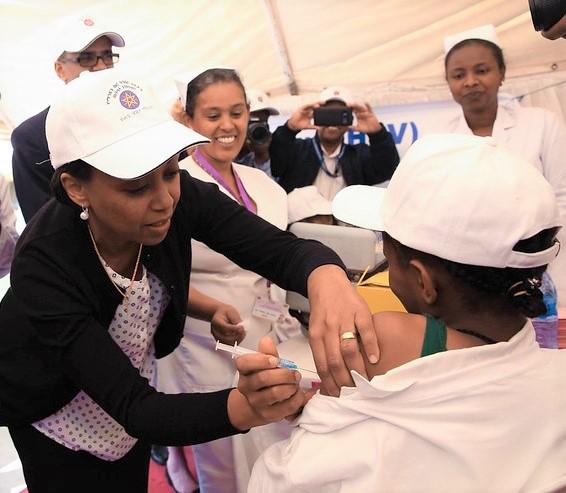The World Health Organization's (WHO's) Strategic Advisory Group of Experts on Immunization (SAGE) late last week said one dose of the human papilloma virus (HPV) vaccine—not the standard three-dose regimen—offered good protection against cervical cancer, a move the WHO is calling a "game-changer."
SAGE said the updated guidance on the vaccine schedule follows recent evidence that one-dose regimens perform just as well as two- or three-dose schedules and will lead to wider uptake and better adherence in low-income countries.
"The HPV vaccine is highly effective for the prevention of HPV serotypes 16 & 18, which cause 70% of cervical cancer," said Alejandro Cravioto, MD, SAGE chair, in a news release. "SAGE urges all countries to introduce HPV vaccines and prioritize multi-age cohort catch up of missed and older cohorts of girls."
According to the WHO, 95% of cervical cancer is caused by sexually transmitted HPV, which is the fourth most common type of cancer in women globally, with 90% of affected women living in low- and middle-income countries. Eighty percent of all cervical cancer deaths occur in Africa.
The HPV vaccine makes death from cervical cancer almost entirely preventable. In 2020, the WHO set a goal of vaccinating 90% of the world's 15-year-old girls against HPV by 2030. Currently, global coverage with two doses is only 13%.
"This single-dose recommendation has the potential to take us faster to our goal," said WHO Assistant Director-General Princess Nothemba (Nono) Simelela, MD.
SAGE recommended changing the vaccine schedule to the following: One or two doses for girls ages 9 to 14 and one or two doses for women 15 to 20. Two doses spaced 6 months apart are recommended for women aged 21 and older.
Kenyan study supports SAGE guidance
Yesterday, the New England Journal of Medicine published a study that supports the SAGE decision, showing one dose was as effective as three in preventing vaccine-type HPV infection in African women ages 15 to 20. The study was conducted in Kenya.
The randomized, controlled trial enrolled 2,275 women between December 2018 and June 2021 to receive either a single-dose nonavalent (HPV 16/18/31/33/45/52/58/6/11 infection) or bivalent (HPV 16/18 infection) HPV vaccination, compared with meningococcal vaccination. Cervical and vaginal swabs were collected during an 18-month follow-up period.
A total of 758 participants received the nonavalent HPV vaccine, 760 received the bivalent HPV vaccine, and 757 received the meningococcal vaccine.
Nonavalent vaccine efficacy (VE) was 97.5% (95% confidence interval [CI], 81.7% to 99.7%; P≤0.0001), and bivalent VE was 97.5% (95% CI, 81.6% to 99.7%; P≤0.0001).
The authors estimate that offering single-dose vaccines would cut the cost of HPV vaccination programs in half.
"The high level of efficacy builds on observational data and provides, should the effect be sustained, evidence for single-dose HPV vaccination to prevent persistent HPV infections, which could increase vaccine access and coverage, offering a cost-effective strategy for cervical cancer prevention," the authors concluded.
"This trial brings new energy to the elimination of cervical cancer. It brings great hope to the women living in countries like Kenya, who have a high burden of the disease," said Nelly Mugo, MD, MPH, co-principal investigator of the study and a researcher at the Center for Clinical Research at the Kenya Medical Research Institute in Nairobi in a press release.






















